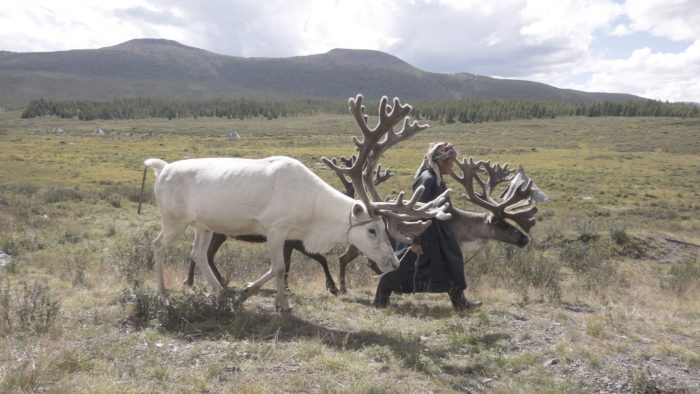5 Life-Changing Lessons I Learned From Reindeer Herders in Mongolia.
After a 2-day trek by horseback, with legs so sore I could barely stand, and 10 days without a shower, I had finally arrived at my destination – a remote northern area of Mongolia called The Taiga. My journey to document a modern day nomadic tribe, who live closely with their reindeer, had taken me nearly 1500 miles from the Mongolian capital city, Ulaan Baatar.
Upon arriving at the Dukha village I revelled at the reindeer honking their greetings at me and was overcome upon finally seeing them with my own eyes. Eventually retiring to the teepee that would be my home for the next couple of nights, I watched in the distance as a family set up more teepees for the influx of visitors that would be coming to their village.
For thousands of years, the nomadic Dukha people have traveled through rugged forests and alpine tundras with their reindeer. Their relationship is more of a partnership, developed over the time by supporting the other to survive the harsh Mongolian winters.
I was sitting in a warm teepee and sipping hot milk tea when I was greeted by the village matriarch who shared fresh cheese made from boiling reindeer milk. Above my head, hanging from teepee stakes, were the cheesecloth bundles from days of work. I took a bite, and the crumbly and sour cheese tingled my taste buds. The cold temperature and days on horseback really made me appreciate the little things, and as we smiled at each other I wondered if she felt the same.
1 – Magic is in the present moment.
Without distractions like a cell phone or the internet, it was easier to be present. The stunning location and people invited me to be more open and curious and without the constant pull of thoughts, I found myself smiling more and playing more.
When we give ourselves permission to fully immerse in the moment, we hear more clearly what others were saying, and we gain more from their stories. We also get rid of the chatter, so we’re open to receive the gifts of each moment.
2 – We need less than we believe.
There are a plethora of products and brands to choose from, all with the promise of making our lives better. But do they? The conveniences of products to make us more beautiful, and media messages have inadvertently created the idea that we’re never enough. Even with all that’s available, statistics show that modern people are more depressed than ever.
Instead of focusing on always growing and gaining, the path to peace is about feeling grateful for what you already have, and deeply listening in whenever you might feel inadequate. When we can look at the simplest things as sources of great abundance, we realize that we don’t need as much as we thought.
3 – We should listen more than we speak.
Occasionally I’m guilty of speaking as soon as I feel as though I can contribute – cutting people off, not because I mean to, but because I want to help. While with the Dukha I found the best lessons mostly came through observing, and not always talking.
When we can be present for others, and offer to them our fullest attention we not only present our best selves, but we also reap the benefits! Listening and observing helps us to understand others better, and enriches our own lives from the the stories of others.
4- We should honour our elders.
It was beautiful to witness the grandmothers and grandfathers of the Dukha people still held in high regard as the decision-makers and ceremony facilitators for the community. Sadly, I feel like we’ve lost this reverence in our modern society as we prioritize youth.
We have living libraries of stories and knowledge within our elders, if only we would be more active in connecting with them. By understanding where we came from, we can have a clearer path of where we want to go. Your elders may pass on knowledge about the land, traditions, and mythology that you would otherwise not picked up. They’ll probably also teach you a lot about resilience and courage.
5 – A smile connects across all languages … even with reindeer.
If you thought smiles are limited only to humans, think again. The first day, I fearfully tiptoed in behind a group of reindeer to get a closer shot with my camera. They must’ve sensed my trepidation because they immediately high-tailed off into the distance. Once I learned just how gentle and demure these creatures where, I could approach these gentle giants with a smile, and they would smile back at me in the form of requests for antler scratches.
Even though we don’t always share a common language, we do share common experiences; with a smile, you’re sharing the present moment with kindness. Smiling eyes make us feel that we’re seen and recognized, and it’s a small gesture that can make a big difference in someone’s day.
Huddled around the teepee fire on the final night in the village, I reflected on my time there and what continued to resonate was that happiness truly has nothing to do with status, prestige, or the number in your bank account. It’s about the simple things, the caring interactions, the symbiotic relationship with nature – These are the things that the Dukha gave me that I’ll carry on through my everyday life.









Read 0 comments and reply